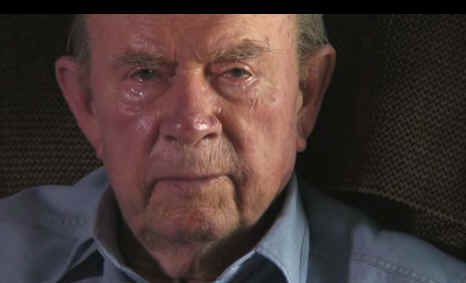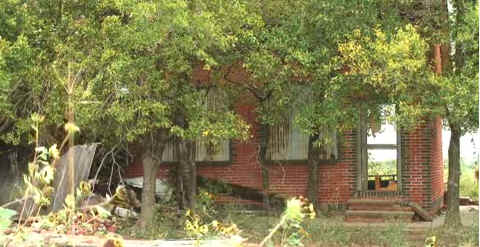|
Henry Bellmon, 88, a farmer who became
Oklahoma's first Republican Governor, died on Tuesday
September 29. Bellmon also served 12 years in the US Senate
and one two year term in the state House of Representatives.
Bellmons body will lie in repose at the State Capitol from
10:00am - 4:00pm on Friday October 2.
Funeral services will be held at 10:00am Saturday at the
First Presbyterian Church, 1001 South Rankin in Edmond, and
at 3:00pm Saturday at the First Presbyterian Church
in Edmond.

Former Oklahoma Gov. Henry Bellmon poses outside his family's
home near Billings.

BELLMON, Henry Louis, a
Republican Senator from Oklahoma; born on a farm near Tonkawa,
Kay County, Okla., September 3, 1921; educated in Noble County
public schools; graduated Oklahoma State University (then
Oklahoma A.&M. College) 1942; served in United States Marine
Corps 1942-1946; farmer and rancher; served in Oklahoma house of
representatives 1946-1948; State Republican chairman 1960;
elected Oklahoma’s first Republican Governor in 1962, served
1963-1967; while in office, chairman, Interstate Oil Compact
Commission, and member, executive committee, National Governors
Conference; elected as a Republican to the United States Senate
in 1968; reelected in 1974 and served from January 3, 1969, to
January 3, 1981; was not a candidate for reelection in 1980;
co-founder and co-chairman of the Committee for a Responsible
Federal Budget; appointed director of the Oklahoma Department of
Human Services 1983; elected Governor of Oklahoma 1986; is a
resident of Red Rock, Okla.
Military service: USMC (1942-46, WWII) awarded the
Silver Star
Governor of Oklahoma (12-Jan-1987 to 14-Jan-1991)
Father: George Bellmon
Mother: Edith Caskey
Wife: Shirley Osborn (m. 24-Jan-1947)
Love of the farm shapes Henry Bellmon's life
November 2007
BILLINGS — It was no secret that while Henry Bellmon was
governor of Oklahoma, he and first lady Shirley Bellmon went
back to the farm in Oklahoma as often as they could on weekends.
[Billings,
Noble County, Oklahoma]Even living in Washington as a U.S. senator couldn't keep
Bellmon away from the farm east of Billings. Bellmon, 86,
recently talked about his love of the land and
what it taught him.
"His desire when he was in the Senate was to go back to
Oklahoma every weekend and spend part of that time at the farm.
Most of the time that desire was realized,” said Andrew
Tevington, an assistant district attorney in Oklahoma County and
Bellmon's press secretary in Washington and chief of staff and
legal counsel while Bellmon was governor a second time.
Bellmon liked to be on the farm, getting his hands dirty and
doing all the things farmers do, Tevington said.
"We always knew when he had been on the farm and had
been working. It gave him time to think, and he would come back
with more ideas than we could handle,” Tevington said.
"This was home,” Bellmon said of the farm. "You
get your head cleared pretty quick.”
Bellmon's family
His father, George Bellmon, was a native of Kansas who had come
to No Man's Land with his parents and lived in a dugout beside
the Beaver River. Bellmon's father's first wife died on
Armistice Day at the end of World War I.
Bellmon's mother, who was the second wife of Bellmon's
father, George, taught school and looked after her parents until
they died.
Edith Caskey Bellmon was about 34, and Bellmon's father, was
about 10 years older when they met and married.
Henry Bellmon was the oldest of the four boys of his mother,
Edith, and his father, George. His father was a staunch
Republican who worked as a teamster, but he always kept land.
He was kind of a philosopher who had many sayings, Bellmon said.
One of the more important sayings was:
"You ain't learnin' nothing when you're talkin',” Bellmon said.
Bellmon took that philosophy into public life many years later.
"My mother managed to keep what I think of as a happy house,
a happy home for four boys who were pretty competitive. I think
she's probably the greatest woman I ever knew, with the
exception of my wives. She was determined that we get good
educations,” Bellmon said.
The last time he saw his mother was when he left to go into
the Marine Corps.
She worked as a school teacher during the war until she got
leukemia, and died while he was overseas.
Bellmon, a Marine tank commander, was part of a Marine group at
Tinian Island getting ready to go to Iwo Jima for what would
become a hellish battle. "They called me on the tank radio and
told me that my mother died,” Bellmon said
Back home
When the war ended, Bellmon was given leave and took the USS
Baltimore from Pearl Harbor to San Francisco.
Nobody was there to meet him, so he got a ride on a bus to a
nearby air base, took a train to San Diego and was put on an
airplane for Oklahoma City. "When I landed in Oklahoma City,
there was nobody there to meet me, so I hitchhiked home,” he
said. "I was a surprise to my dad.”
When he returned to the farm, he met Shirley Osborn. Their
families had been friends and the Osborns lived six miles from
the Bellmon farm. They married in January 1947. Bellmon says she
was the reason for his success in politics. She organized the
Bellmon Belles, a group of women who helped support him in his
campaign for governor, which he won in 1962, becoming the first
Republican elected governor. She was part of his campaigns for
the U.S. Senate and for a second term as governor. Shirley died
unexpectedly in 2000 while the family was on vacation in
Massachusetts. In 2002, Bellmon married Eloise Bollenbach.
Eloise and her late husband, Kingfisher rancher Irvin K.
Bollenbach, were longtime friends of the Bellmons.
Going Home: Henry Bellmon
BILLINGS — Trees cover much of the old red schoolhouse
that Henry Bellmon attended nearly 80 years ago, but nothing
covers his memory of it.
He walked a mile and a quarter to school, carrying a lard bucket
with a hearty lunch fixed by his mother.
“My first memory is the first day of school, eating fried
chicken and sitting on the (school’s) porch,” Bellmon recalled.
The one-room school had one teacher and 45 to 50 students in
grades one through eight.
Bellmon, whose mother pushed him to learn as fast as he could,
was advanced one grade.
“I learned almost by osmosis,” said Bellmon, explaining he could
easily hear what kids in higher grades were learning and
reciting.
The old school, now boarded up, sits at the corner of State
Highway 15 and the farm road that leads past Bellmon’s farm and
continues past the more than 100-year-old farm house where he
was reared.
Bellmon, who is 86, spends some days at the farm east of
Billings and other days at Kingfisher where his second wife,
Eloise, is from.
He sat in a chair in his den recently, discussing farm life and
whether things had changed much during his 86 years.
On an end table is a replica of the flag-raising at Iwo Jima
where Bellmon fought as a Marine and was awarded the Silver Star
for bravery.
Down a hallway are photos including ones of him and President
Nixon, and of his late wife, Shirley, with Patricia Nixon and
Judy Agnew, wife of vice president Spiro T. Agnew.
Another picture is of Bellmon in 1965 on the beach of Iwo Jima,
where he was a tank commander in 1945.
Wherever he’s been in his life — the governor’s office,
U.S. Senate or the Pacific island battlefields — Bellmon always
is drawn back to the land where he learned how to be
self-reliant and how to make ends meet through the Depression
and droughts of the 1930s.Schools

BILLINGS — Trees cover much of the old red schoolhouse that
Henry Bellmon
attended nearly 80 years ago, but nothing covers his memory of
it.
Billings and Marland
Billings and Marland were about the size they are now. His
parents didn’t go into Marland much. Billings was where they
attended church.s
“It had two grocery stores, two cafes, three filling
stations, a bank, which they still have, and several
churches,” he said of Billings.
His mother was superintendent of the Methodist Church’s
Sunday school for 25 years, he said.
But the family’s life revolved around the farm.
The farm life
The Bellmon
homestead is not far from his present farmhouse. His father
bought it probably 105 years ago, Bellmon
said. It had two rooms then but was expanded over the years.
Until Bellmon’s first year at Oklahoma A&M, now called Oklahoma
State University, it had no electricity
“Electricity was turned on before Thanksgiving” of his
freshman year in college, he said.
Asked what values he learned from farming, Bellmon said:
“There are some religious values — you put your
confidence in another year’s crop and wait a year before you
can harvest.”
Farmers get up early in the morning, and Bellmon
has displayed that trait throughout his life.
“I’ve seen him get out of bed at 4 (a.m.) and drive 20
miles and get on a bulldozer when the weather was inclement,”
said brother, George, said of the times after World War II when
they were in business together farming, building ponds and doing
other work with bulldozers.
Other times, George said he saw his brother, Henry, just lay
down at night and go to sleep near a job site rather than drive
all the way back home.
Farming wasn’t a battle with nature, as far as Bellmon
was concerned.
“I didn’t think of it as a battle as much as a
cooperative effort. We did what we could and Mother Nature did
the rest. We were never without food. Mother put up dozens and
dozens of jars of meats and peas and beans. We stored probably
20 bushels of potatoes in the cellar.”
At some point, someone had to go into the cellar and see if
any potatoes had spoiled.
“An experience you’d like to forget is picking up a
spoiled potato and squeezing it to find out if it was.”
His father saved a wagon load of wheat each year which was
turned into flour and used to make a product called cream of
wheat. It would last a year or until the next harvest, Bellmon
said.
One thing he didn’t enjoy was driving horses.
“I detested driving horses on ground that had gotten hard
and cloddy,” he said.
Bellmon
and his brothers helped work the farm, but there was fun too for
the four boys.
“Basically, we prowled up and down the creek, hunting for
squirrels and rabbits...we skinned possum and skunks and sold
their hides for 50 cents to a dollar each. We got spending money
that way. We didn’t participate in organized athletics because
there was no opportunity.”
Often, the boys from neighboring farms would get together in
somebody’s cow pasture and play baseball, his brother, George,
83, recalled.
Attraction of the farm
“In farming, you don’t move around much. You are tied to
the land, although I did make a living in Oklahoma City,”
Henry
Bellmon said.
It was no secret that while Bellmon was governor, he and first lady
Shirley Bellmon went back to the farm as often as they could
on weekends.
Even living in Washington as a
U.S.
senator couldn’t keep
Bellmon
away from the farm.
http://bioguide.congress.gov/scripts/biodisplay.pl?index=B000351
http://www.nndb.com/people/276/000119916/
Complied and transcribed by Marti Graham, 2009.
|



